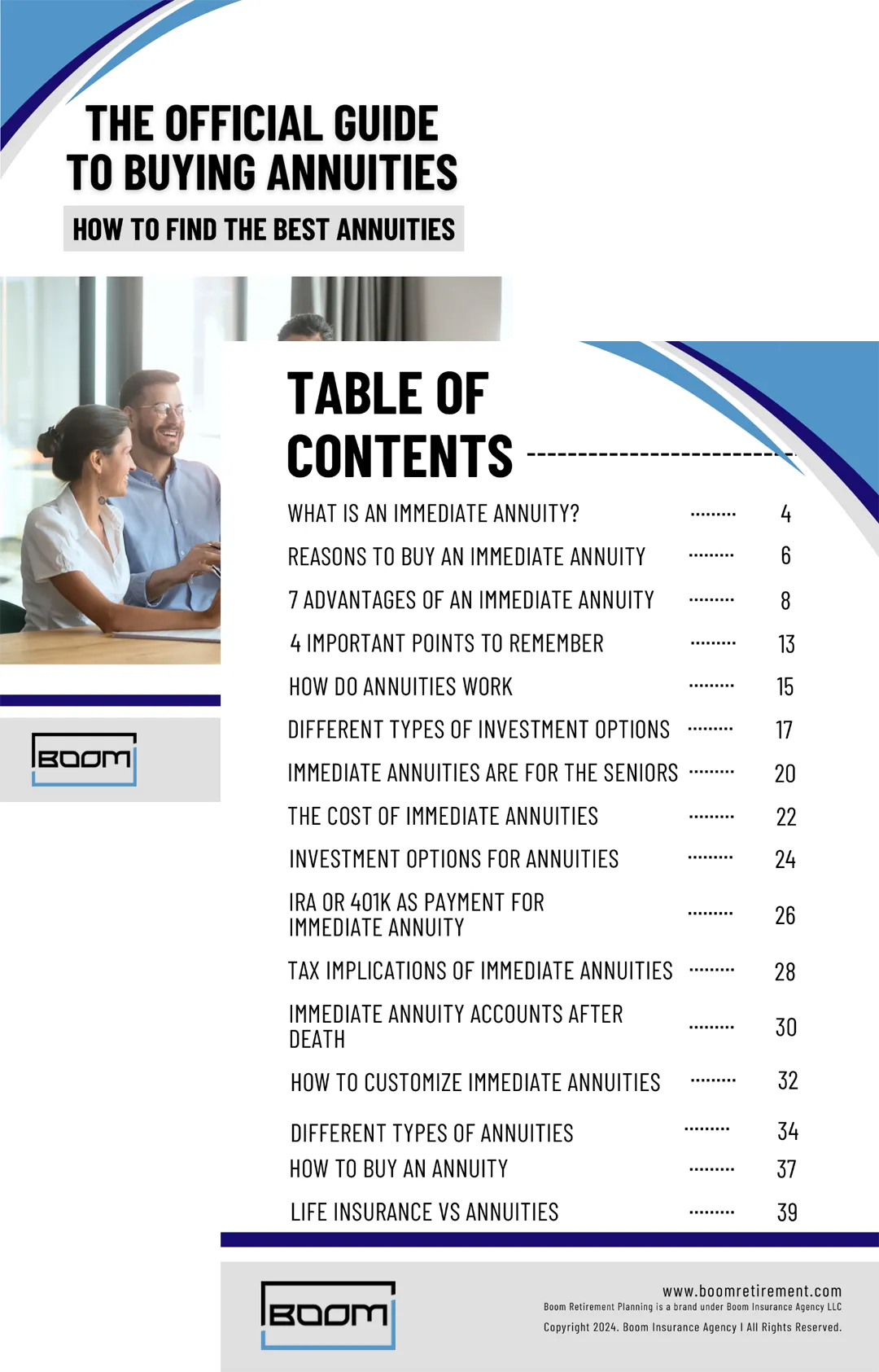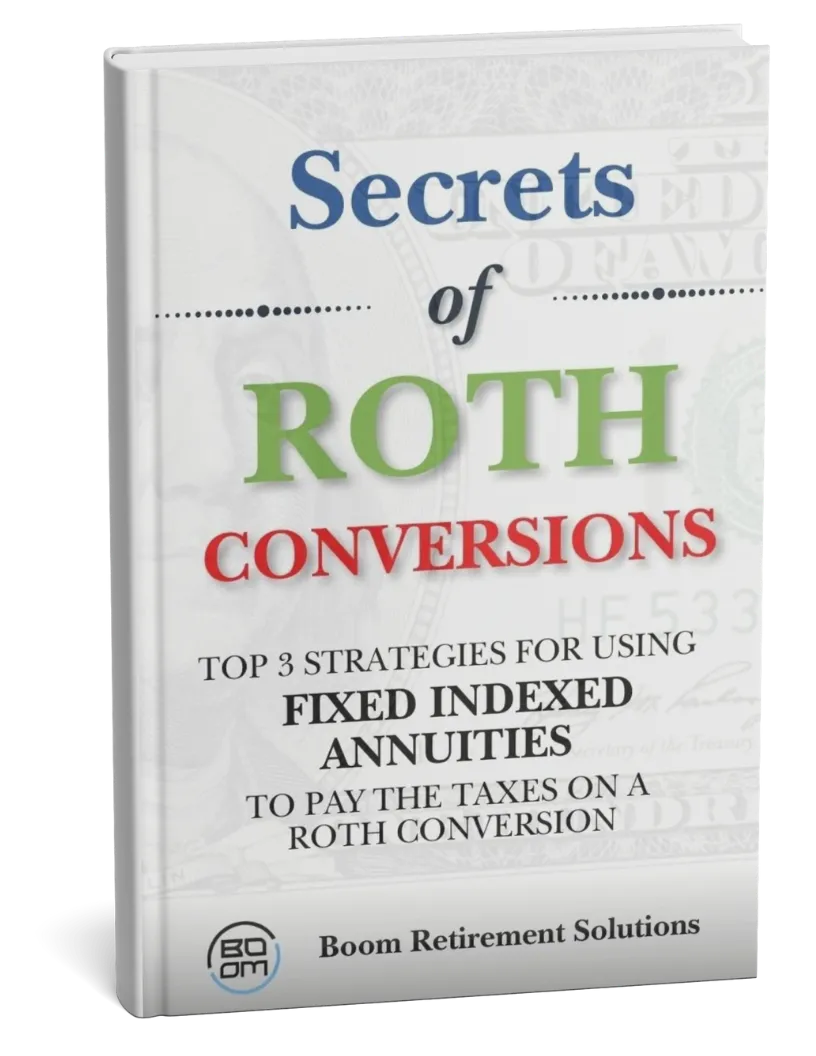
BOOM RETIREMENT SOLUTIONS
Strategies for Boosting Retirement Income

Top Retirement Cash Flow Risks
Why you need this Retirement Toolkit
Will outlive your retirement savings?
Will taxes and inflation erode your Retirement Nest Egg?
Will you head into retirement using an Accumulation Strategy or a Decumulation Strategy?
Will you maintain your lifestyle in a market downturn?
Are you prepared for RMD's and IRMAA?
BOOM RETIREMENT PLANNING
Strategies for Boosting Retirement Income
If You Ask 50 Financial Advisors,
"What is the best way to retire?".
You will get 50 different answers!
That is because despite all their training and certifications,
financial advisors each bring their own perspectives, experiences, and
biases to the table, leading to varied approaches and strategies tailored to their
unique understanding of the market, client needs, and risk tolerance.
Economic Science and Math proves...
There is Only One Optimal Way to Retire
Over 6 Decades of Research Created the 7 Steps Below.
Develop a Plan: Assess your financial situation, retirement goals, income sources and monthly budget for expenses.
Secure Lifetime Income: Consider products like private pensions for guaranteed income.
Maximize Social Security: Optimize benefits by understanding your options; delaying to 67 or 70 can help.
Diversify Investments: Build a balanced portfolio—30% cash value life insurance, 30% lifetime income, 40% growth assets.
Prepare for Health Care Costs: Budget for health expenses, including long-term care, which most seniors will need.
Use Tax-Efficient Strategies: Consider Roth conversions to reduce retirement taxes.
Stay Active and Engaged: Pursue activities for mental, physical, and emotional well-being in retirement.
Our Blog

What is an Annuity?
What is an Annuity?
By Jeff Weidner
Introduction: Annuities Explained
When it comes to retirement planning, you may have heard of annuities but aren’t sure what they actually are or if they’re right for you. Simply put, an annuity is a financial product that allows you to invest money with an insurance company, which then provides you with regular income in return. Many retirees consider annuities for the potential to receive a steady stream of income throughout their retirement years. In this article, we’ll break down the different types of annuities, why people buy them, and answer some common questions about them to help you decide if they could be a good option for your financial future.
What is an Annuity?
An annuity is a contract between you and an insurance company. You invest a certain amount of money, and in return, the insurance company agrees to provide you with income in the future. Annuities come in various types, each offering unique benefits depending on your needs. Typically, people choose annuities for two main reasons: guaranteed income and tax advantages.
Types of Annuities
Understanding the types of annuities available can help you find one that aligns with your financial goals. Here’s a look at the most common options:
1. Immediate Annuities
An immediate annuity begins paying you income almost immediately after you make an investment, usually in a single lump sum. This type of annuity can be structured to provide payments over a specified period (like 10 or 20 years) or for the rest of your life. Immediate annuities are a popular choice for people who need income right away, like those entering retirement.
2. Deferred Annuities
A deferred annuity has two main phases:
Accumulation Phase
During the accumulation phase, you invest money in the annuity—either in a single payment or over time. This money grows tax-deferred, which means you won’t pay taxes on your earnings until you start making withdrawals.
Distribution Phase
When you reach the distribution phase, you start taking money out of the annuity. This could mean setting up regular withdrawals or “annuitizing” your investment, which converts your balance into a steady income stream for a set period or life.
3. Fixed Annuities
A fixed annuity provides a guaranteed interest rate on your investment. It’s ideal for those looking for a predictable income with minimal risk. Fixed annuities can be a secure way to grow retirement funds without worrying about market fluctuations.
4. Fixed Indexed Annuities
A fixed indexed annuity combines the safety of a fixed annuity with the growth potential of a market index, like the S&P 500. Your return is tied to the performance of the index, which means you have a chance to earn higher returns when the market performs well. These annuities also protect your principal, meaning you won’t lose money if the market drops.
5. Variable Annuities
A variable annuity allows you to invest in various sub-accounts, much like mutual funds. Your income depends on the performance of these investments, so there’s potential for higher returns. However, there’s also a greater level of risk involved since your payments are not guaranteed.
Why Buy an Annuity?
Annuities can offer several benefits, making them an attractive option for many retirees. Here are some of the main reasons people consider purchasing an annuity:
Guaranteed Income
Annuities can provide a guaranteed income stream for life, helping you avoid the worry of outliving your savings.
Tax Advantages
With tax-deferred growth, you don’t pay taxes on your annuity earnings until you begin to withdraw them, which can be a significant tax benefit over the long term.
Protection of Principal
Some annuities offer protection against losses if the market takes a downturn, making them an appealing choice for those looking to safeguard their investment.
Potential for Growth
Certain annuities, such as fixed indexed and variable annuities, offer growth potential tied to the performance of the stock market, giving you a chance for higher earnings.
FAQs About Annuities
Here are answers to some of the most frequently asked questions about annuities to help you understand if they’re a good fit for your retirement strategy.
What are the different types of annuities?
Annuities come in various forms, including immediate, deferred, fixed, fixed indexed, and variable. Each type has its own benefits and potential drawbacks, so it’s essential to understand which one best suits your needs.
How do annuities compare to CDs?
Annuities and CDs (Certificates of Deposit) are both savings options but have key differences. Annuities can offer guaranteed income for life, which CDs do not. Additionally, fixed annuities often provide better interest rates compared to CDs.
Are there tax benefits to owning an annuity?
Yes, annuities offer tax-deferred growth, meaning you don’t pay taxes on earnings until you withdraw them. This can be beneficial for long-term savings and retirement planning.
Can I lose money in an annuity?
It depends on the type of annuity. Fixed and fixed indexed annuities generally protect your principal, while variable annuities carry the risk of loss since they’re tied to the stock market.
When is the best time to buy an annuity?
The right time depends on your financial situation and retirement goals. Many people purchase annuities in their 50s or 60s as they approach retirement and seek a reliable income source.
FAQs About Boom Retirement Solutions
Who is Boom Retirement Solutions?
Boom Retirement Solutions specializes in helping individuals create secure retirement plans through tax-advantaged products like annuities and other guaranteed income solutions. They provide personalized guidance to help clients make informed financial choices for a comfortable retirement.
How can Boom Retirement Solutions help with annuities?
Boom Retirement Solutions offers expert advice on selecting the right type of annuity based on your needs. They help clients understand their options, weigh the benefits, and structure annuities to maximize income and minimize taxes.
What makes Boom Retirement Solutions unique?
Boom Retirement Solutions stands out for its personalized approach, focusing on creating a retirement plan that balances guaranteed income, tax advantages, and growth potential to suit each client’s unique goals.
Final Thoughts
Annuities can be a valuable tool for retirees seeking guaranteed income, tax advantages, and peace of mind. However, it’s crucial to select the type that aligns with your financial situation and retirement goals. Whether you’re considering an immediate, deferred, or indexed annuity, always consult with a qualified financial advisor to ensure the product suits your needs. If you’re interested in learning more, reach out to Boom Retirement Solutions for personalized guidance on your retirement options.
Please note that this article is for informational purposes only and should not be considered financial advice. Be sure to consult with a licensed retirement specialist to determine the best retirement strategy for you.
4o
Taxation can play a substantial role in determining
the overall value of your retirement portfolio
How are your current retirement income sources taxed?
Social Security
Qualified Accounts
Non-Qualified Accounts
Social Security is a federal government program in the United States that provides financial benefits to eligible individuals, primarily retirees, disabled individuals, and their families. It is funded through payroll taxes collected under the Federal Insurance Contributions Act (FICA) and the Self-Employment Contributions Act (SECA).
Key components of Social Security include:
Retirement Benefits: These benefits are available to workers who have paid into the Social Security system through payroll taxes during their working years. Individuals can start receiving reduced retirement benefits as early as age 62, but full benefits are available at the full retirement age, which varies depending on the year of birth. Delaying benefits beyond full retirement age can increase the monthly benefit amount.
Disability Benefits: Social Security Disability Insurance (SSDI) provides benefits to individuals who are unable to work due to a qualifying disability. To be eligible, individuals must have a sufficient work history and meet specific medical criteria.
Survivor Benefits: These benefits are paid to the surviving spouses, children, or dependents of deceased workers who paid into the Social Security system. The amount of the benefit depends on the deceased worker's earnings record.
Supplemental Security Income (SSI): Although administered by the Social Security Administration, SSI is a separate program funded by general tax revenues (not Social Security taxes). It provides financial assistance to elderly, blind, or disabled individuals with limited income and resources.
Social Security is a critical component of retirement planning for many Americans, providing a safety net to ensure a basic level of income in retirement, during periods of disability, or after the death of a family member.
Social Security benefits may be taxed based on your combined income, which includes adjusted gross income, nontaxable interest, and half of your Social Security benefits. Depending on your income level, up to 85% of your benefits could be subject to federal income tax.
A qualified account is a type of retirement savings account that offers tax advantages, typically regulated by the IRS under specific sections of the tax code. Contributions to qualified accounts are often tax-deferred, meaning that contributions are made with pre-tax dollars, reducing the individual's taxable income in the year of the contribution. Taxes on contributions and investment earnings are deferred until withdrawals are made, usually in retirement.
401(k) plans
403(b) plans
457 plans
Traditional IRAs
SEP IRAs
SIMPLE IRAs
Self Directed IRAs
Pensions
Annuities
Withdrawals from these accounts are generally subject to income tax, and there may be penalties for early withdrawals before a certain age (usually 59½). Additionally, qualified accounts are subject to Required Minimum Distributions (RMDs) once the account holder reaches age 73 (if born before 1960).
Required Minimum Distributions (RMDs) are the minimum amounts that retirees must withdraw annually from their tax-deferred retirement accounts, such as traditional IRAs and 401(k)s, starting at age 73 (as of 2023). The amount of the RMD is calculated based on the account balance and the account holder's life expectancy. Failing to take RMDs can result in significant tax penalties, including a hefty excise tax on the amount that should have been withdrawn.
A non-qualified account is a type of investment account that does not have the same tax advantages or restrictions as qualified retirement accounts. Unlike qualified accounts, contributions to non-qualified accounts are made with after-tax dollars, meaning there's no tax deduction for contributions.
Examples of non-qualified accounts include:
Brokerage accounts
Mutual fund accounts
Certificates of deposit
Savings accounts
Roth IRA
Cash Value Life Insurance
Annuities
These accounts are often used for general savings and investments outside of retirement, offering more flexibility in terms of contributions and withdrawals, but without the tax advantages of qualified accounts.
The exception is the Roth IRA in which the principal, interest, earnings and dividends are all tax-free. Roth IRAs are also not subject to RMD's.
A Roth conversion is the process of transferring funds from a Qualified retirement accounts into a Roth IRA (Non-Qualified Account). The converted amount is subject to income tax in the year of the conversion, but future withdrawals from the Roth IRA are tax-free, provided certain conditions are met. This strategy is often used to reduce taxable income in retirement and to avoid required minimum distributions (RMDs).
Books for Retirees and Soon-To-Bes
Choose Your Book
Roth conversions


transitioning


Retirement Income


Tax Strategies




Long Term Care



Boom Final Expense is a brand under Boom Insurance Agency LLC
©Copyright 2023| Boom Insurance Agency. All Right Reserved

Boom Retirement Planning is a brand under Boom Insurance Agency LLC
©Copyright 2024| Boom Insurance Agency. All Right Reserved





